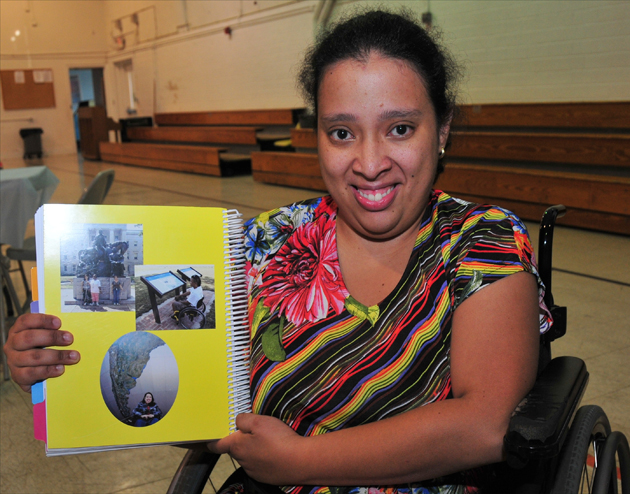For Immediate Release
 Anelys Rojas, a young woman from Venezuela who lives in Cary, is learning English. She helped test accessibility at several sites in the Spanish-language travel guide for people with disabilities: ACCESO Carolina del Norte. On the back cover of the book is a photograph of her outside the N.C. Museum of Natural Science in Raleigh.)
Anelys Rojas, a young woman from Venezuela who lives in Cary, is learning English. She helped test accessibility at several sites in the Spanish-language travel guide for people with disabilities: ACCESO Carolina del Norte. On the back cover of the book is a photograph of her outside the N.C. Museum of Natural Science in Raleigh.)
Raleigh, N.C. - The N.C. Department of Health and Human Services hosted a roll-out event for the Spanish version of ACCESS North Carolina, titled ACCESO Carolina del Norte, on Friday, December 6. The publication, which was originally printed in English, provides details on the accessibility of nearly 400 tourist sites across North Carolina, including specific information about parking, types of paths, entrances, restrooms, water fountains and elevators.
"This is a very important source of information for individuals with disabilities and it enhances the quality of life for individuals who previously were unable to access areas for vacation and relaxation," said Sherry Bradsher, Deputy Secretary of Human Services.
"ACCESO Carolina del Norte is a very important resource for the community and the Spanish population," added Felipe Cabrera, Latino Outreach Specialist.
The guide was assembled with information gathered from visits to sites with a tape measure, and from phone calls and questionnaires returned that were sent to hundreds of sites across the state. It is available in print, CD and on-line format and will soon be available at various DHHS offices and all of North Carolina's Welcome Centers. It is also available in text format for individuals with vision loss who use a screen reader. This travel resource is funded through fees from special license plates, which also help to pay for improving accessibility at state-owned tourist sites, such as adding captioning to visitor center videos or improving physical access at campgrounds and bathhouses.
The on-line English and Spanish PDF and text versions are available at:
ncdhhs.gov.
Anyone wishing to request a copy in print or CD format can email access.nc@dhhs.nc.gov to request a copy.
NC Department of Health and Human Services
2001 Mail Service Center
Raleigh, NC 27699-2001
news@dhhs.nc.gov •
(919) 855-4840




























But from my lowly perspective, the McCrory Administration will always be better at "reaching out" than this lowly county commissioner.